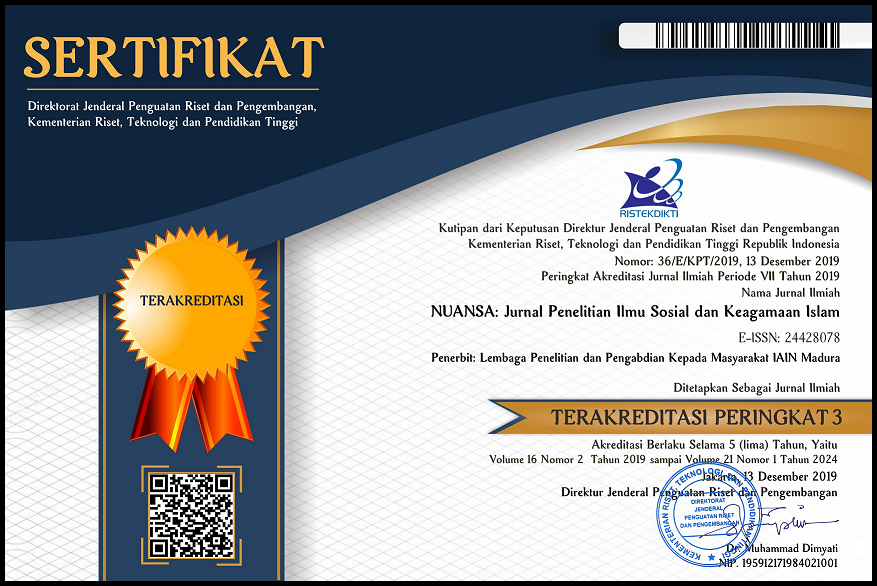INTERNALISASI KONSEP MASLAHAH MELALUI BUKU SAKU DALAM MENGUATKAN KARAKTER ISLAMI SISWA DI MTs NEGERI SUMBER BUNGUR PAMEKASAN
 Abstract views: 191
,
Abstract views: 191
,
 PDF downloads: 171
PDF downloads: 171
Abstract
This writing is trying to analyze the effort of strengthening and internalizing the students’ Islamic characteristics through their pocket book. Based on the research data, MTsN Sumber Bungur pamekasan did a concrete way to strengthen the students’ Islamic characteristics by integrating them in every aspect of the lesson. Besides, there is also an effort to internalize the maslahah concept in the application of students’ rule that can be seen from violation clarification and also the punishment which categorized into serious, medium, and small violation.
The application of violation clarification and punishment category given is a concept of Maslahah and practical guidance. In the context of maslahah, serious, medium, small violation can be suited into dharurah, hajiyah and tahsiniyah.
The concept of strengthening the students’ Islamic characteristics through the students’ pocket book in MTsN Sumber Bungur Pamekasan has done by giving punishment in the form of giving point from 0- 100 by giving violation clarification to serious, medium and small violation. The internalization of Maslahah concept through the students pocket book in order to strengthen the students’ Islamic characteristics in MTsN Sumber Bungur Pamekasan is the application of Maslahah Dharuriyah, Maslahah Hajiyah and Maslahah Tahsiniyah which in practice it belongs to serious, medium, and small violation which oriented on the effort to bring goodness, peaceful, comfortable situation appropriate with the Sharia.Downloads
References
‘Abd Wahhab Khallaf, Masadir al-Tasyri’ al-Islami fi ma la nass fihi (Kuwait: Dar al-Qalam, 1972)
Abd. al-Rahman dan Ahmad Usman, Manahij al-Bahts al-‘ilm wa turuq al-kitabah, (Beirut: Dar al-Fikr t.t.)
Abd. Mukhid, Konsep Pendidikan Karakter dalam al-Qur’an, Nuansa: Jurnal Penelitian Ilmu Sosial dan Keagamaan Islam, Vol. 1 No. 2 Tahun 2016
Abu Hamid Muhammad al-Ghazali, al-Mustasyfa min ‘Ilm al-Ushul: Tahqiq wa Ta’liq Muhammad Sulaiman al Asyqar (Beirut: Muassasat al-Risalah, 1997)
Abu Hamid Muhammad al-Ghazali, al-Mustasyfa min Ilm al Ushul, Vol I (Beirut: Mu’assasat al-Risâlah, 1997)
Abu Ishaq Ibrahim al Syathibi, al Muwafaqat fi Ushul al Syari’ah, Vol. II (Beirut: Dar al Kutub al Ilmiyah, t.t.)
Agus Wibowo dan Hamrin, Menjadi Guru Berkarakter Strategi Mambangun Kompetensi dan Karakter Guru, (Yogyakarta: Pustaka Pelajar 2012)
Ahmad al-Raysuni>, Ijtihad antara Teks, Realitas, dan Kemaslahatan Sosial (Jakarta: Erlangga, 2002)
Ahmad Azhar Basyir, Filsafat Hukum Islam (Jakarta: UII Press, 2000)
Ahmad Tafsir.Pendidikan karakter perspektif Islam (Bandung: PT remaja rosdakarya, 2011)
Amir Syarifuddin, Ushul Fiqh 2 (Jakarta: Logos Wacana Ilmu, 2001)
Barnawi & Arifin,Strategi dan Kebijakan Pembelajaran Pendidikan Karakter (Jogjakarta: Ar-Ruzz Media, 2012)
E. Mulyasa, Manajemen Pendidikan Karakter, (Jakarta: Bumi Aksara. 2011)
H. Aziz, Pendidikan Karakter Berpusat Pada Hati, (Jakarta: PT AlMAwardi Prima, 2011)
Heri Gunawan, Pendidikan Karakter Konsep dan Impementasi, (Bandung: Alfabeta, 2012)
Husain Hamid Hissan, Nazariyat al-Maslahah fi al-Fiqh al-Islami (Beirut: Dar al-Nahdah al-‘Arabiyah, 1971)
Ibn al Qayyim al Jauziyah, I’lam alMuwaqqi’in ‘an Rabb al ‘Alamin (Kairo:Dar al Hadits, 2004)
Imam Suprayogo, Tobrini, Metodologi Penelitian Sosial-Agama (Bandung: PT. Remaja Rosdakarya, 2001)
Ismail Ibn Hammad al-Hauhari, al-Sihah Taj al-Lughah wa Sihah al-‘Arabiyah, Jilid II (Beirut: Dar al-‘Ilm li al-Malayin, 1956)
Jalal al-Din ‘Abd Rahman, al-Masalih al-Mursalah wa Makanatuha fi al-Tasyri’ al-Islami (Kairo: Dar al-Kitab al-Jami’i, 1983)
Kamaruzzaman Bustaman, Islam Historis; Dinamika Studi Islam di Indonesia (Yokyakarta: Galang Printika, 2002)
Mishad, Pendidikan Karakter: Perspektif Islam, Jurnal Edukasi MPA, No. 308, Mei 2012
Mohammad Qosim, ed., Pondok Pesantren di Pamekasan; Pertumbuhan dan Perkembangannya (Pamekasan: P3M, 2002)
Muhammad Abu Zahrah, Ushul al-Fiqh (Beirut: Dar al-Fikr al-‘Arabi, t.t)
Muhammad Alwi al-Maliki, Syariat Isla>m; Pergumulan Teks dan Realitas, (Yokyakarta: el-SAQ Press, 2003)
Muhammad Said Ramadhan al-Buti, Dawabit al-Maslahahfi al-Syari’ah al-Islamiyah (Beirut: Dar al-Fikr al ‘Arabi, 1991)
Muhammad Yusuf Musa, al-Fiqh al-Islami (Cairo: Dar al-Kutub al-Hadi>thah)
Mustafa Ahmad al-Zarqa’, al-Istilah wa al-Masalih al-Mursalah fi al-Syari’ah al-Islamiyah (Beirut: Muassasat al-Risalah, 2000)
Najm al-Di>n al-T{u>fi>, al-Ta'yi>n fi> Sharh al-Arba'i>n (Beirut: Mu'assasah al-Rayyan, 1998)
Quraish Shihab, Membumikan Al-Qur`an (Bandung: Mizan, 1994)
Suparman Usman, Hukum Isla>m; Asas-asas dan Pengantar Studi Hukum Isla>m dalam Tata Hukum Indonesia (Jakarta: Gaya Media Pratama, 2001)
Wah}bah al-Zuhayli>, al-Tafsi>r al-Muni>r fi al-'Aqidah wa al-Shari'ah wa al-Manh}aj vol. 17 (Kairo: Da>r al-Kutu>b al-Ma'a>s}ir, 1991)
Wahbah al-Zuhayli>, Us}u>l Fiqh al-Isla>mi>, vol. 2 (Beirut: Dar al-Fikr, 1986)
Yusuf alQardhawi, Madkhal li Dirasat al-Syari’ah al Islamiyah (Kairo: Maktabah Wahbah, 1990)
----------------------, Nahwa Fiqh Muyassar Mu’asir, Jilid II (Kairo: Maktabah Wahbah, 2008)
----------------------, al-Islam Kama Nu'min Bihi D{awa>bit} wa Mala>mihi>, yang diterjemah dengan judul Reposisi Islam oleh Muhammad Arif Rahman (Jakarta: al-Mawardi Prima, 2001)
The journal operates an Open Access policy under a Creative Commons Attribution-NonCommercial 4.0 International License (CC-BY-NC) 
Authors who publish with this journal agree to the following terms:
- Authors retain copyright and grant the journal right of first publication with the work simultaneously licensed under a Creative Commons Attribution License that allows others to share the work with an acknowledgement of the work's authorship and initial publication in this journal.
- Authors are able to enter into separate, additional contractual arrangements for the non-exclusive distribution of the journal's published version of the work (e.g., post it to an institutional repository or publish it in a book), with an acknowledgement of its initial publication in this journal.
- Authors are permitted and encouraged to post their work online (e.g., in institutional repositories or on their website) prior to and during the submission process, as it can lead to productive exchanges, as well as earlier and greater citation of published work.






















